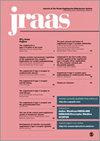Effects of combined statin and ACE inhibitor therapy on endothelial function and blood pressure in essential hypertension - a randomised double-blind, placebo controlled crossover study
IF 4.1
4区 医学
Q3 PERIPHERAL VASCULAR DISEASE
Journal of the Renin-Angiotensin-Aldosterone System
Pub Date : 2019-07-01
DOI:10.1177/1470320319868890
引用次数: 15
Abstract
Background: The aim of this study was to compare the influence of 3-hydroxy-3-methylglutaryl-coenzyme A reductase inhibitors on endothelial function and blood pressure in patients with essential hypertension on long-term angiotensin-converting enzyme inhibitor therapy. Method: The study was designed as a prospective, double-blind, randomised, placebo controlled, crossover clinical trial. Twenty patients with essential hypertension were treated with an angiotensin-converting enzyme inhibitor; the control group included 10 healthy subjects. Hypertensive patients received in random order 80 mg of fluvastatin daily or placebo for 6 weeks. The following parameters were assessed at baseline and after each treatment period: serum lipids, flow-mediated vasodilation, activity of von Willebrand factor, concentration of vascular endothelial growth factor, C-reactive protein and 24-hour blood pressure profile. Results: Hypertensive patients did not differ from healthy subjects with respect to age, body mass and biochemical parameters, with the exception of C-reactive protein, which was higher in hypertensive patients (P=0.02). After statin therapy, low-density lipoprotein cholesterol (P<0.0001), C-reactive protein (P=0.03), von Willebrand factor (P=0.03) and vascular endothelial growth factor (P<0.01) decreased and flow-mediated vasodilation improved (P<0.001). Statins had no significant effect on blood pressure. Conclusions: Statins added to angiotensin-converting enzyme inhibitors may improve endothelial function and ameliorate inflammation independently of blood pressure.他汀类药物联合ACE抑制剂治疗对原发性高血压患者内皮功能和血压的影响——一项随机、双盲、安慰剂对照交叉研究
背景:本研究的目的是比较长期血管紧张素转换酶抑制剂治疗3-羟基-3-甲基戊二酰辅酶A还原酶抑制剂对原发性高血压患者内皮功能和血压的影响。方法:采用前瞻性、双盲、随机、安慰剂对照的交叉临床试验。用血管紧张素转换酶抑制剂治疗20例原发性高血压患者;对照组为10名健康受试者。高血压患者随机接受每日80mg氟伐他汀或安慰剂治疗,持续6周。在基线和每个治疗期后评估以下参数:血脂、血流介导的血管舒张、血管性血变因子活性、血管内皮生长因子浓度、c反应蛋白和24小时血压。结果:高血压患者在年龄、体重、生化指标等方面与健康者无显著差异,但c反应蛋白高于高血压患者(P=0.02)。他汀类药物治疗后,低密度脂蛋白胆固醇(P<0.0001)、c反应蛋白(P=0.03)、血管性血变因子(P=0.03)和血管内皮生长因子(P<0.01)降低,血流介导的血管舒张改善(P<0.001)。他汀类药物对血压没有显著影响。结论:他汀类药物加入血管紧张素转换酶抑制剂可以改善内皮功能和改善炎症,而不依赖于血压。
本文章由计算机程序翻译,如有差异,请以英文原文为准。
求助全文
约1分钟内获得全文
求助全文
来源期刊
CiteScore
6.20
自引率
0.00%
发文量
16
审稿时长
6-12 weeks
期刊介绍:
JRAAS is a peer-reviewed, open access journal, serving as a resource for biomedical professionals, primarily with an active interest in the renin-angiotensin-aldosterone system in humans and other mammals. It publishes original research and reviews on the normal and abnormal function of this system and its pharmacology and therapeutics, mostly in a cardiovascular context but including research in all areas where this system is present, including the brain, lungs and gastro-intestinal tract.

 求助内容:
求助内容: 应助结果提醒方式:
应助结果提醒方式:


